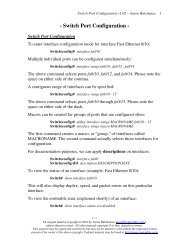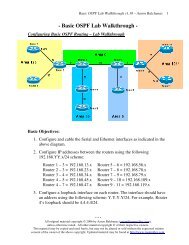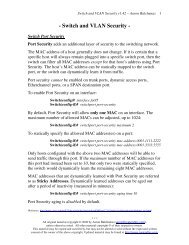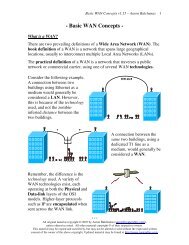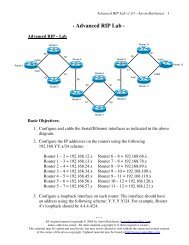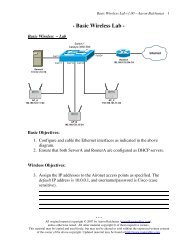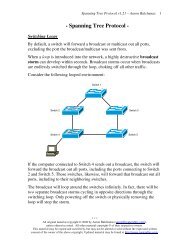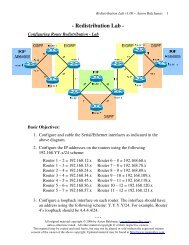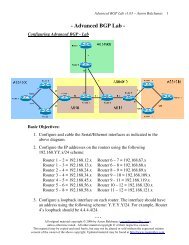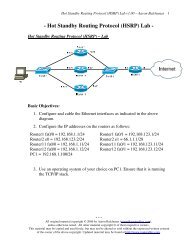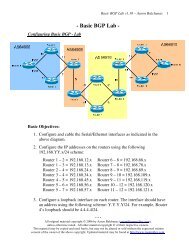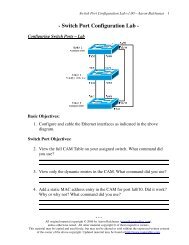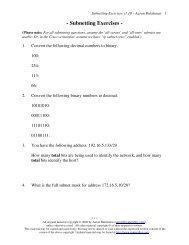Cisco CCNA Study Guide - Router Alley
Cisco CCNA Study Guide - Router Alley
Cisco CCNA Study Guide - Router Alley
Create successful ePaper yourself
Turn your PDF publications into a flip-book with our unique Google optimized e-Paper software.
<strong>CCNA</strong> <strong>Study</strong> <strong>Guide</strong> v2.62 – Aaron Balchunas<br />
103<br />
User Datagram Protocol (UDP)<br />
The User Datagram Protocol (UDP) is a connectionless transport protocol,<br />
and is defined in RFC 768.<br />
UDP, above all, is simple. It provides no three-way handshake, no flowcontrol,<br />
no sequencing, and no acknowledgment of data receipt. UDP<br />
essentially forwards the segment and takes no further interest.<br />
Thus, UDP is inherently unreliable, especially compared to a connectionoriented<br />
protocol like TCP. However, UDP experiences less latency than<br />
TCP, due to the reduced overhead. This makes UDP ideal for applications<br />
that require speed over reliability. For example, DNS primarily uses UDP as<br />
its transport protocol, though it supports TCP as well.<br />
Like TCP, UDP does provide basic error-checking using a checksum, and<br />
uses port numbers to differentiate applications running on the same host.<br />
The UDP header has only 4 fields:<br />
Field Length Description<br />
Source Port 16 bits Source UDP Port<br />
Destination Port 16 bits Destination UDP Port<br />
Length 16 bits Length of the header and the data<br />
Checksum 16 bits Used for Error-Checking<br />
The following provides a quick comparison of TCP and UDP:<br />
TCP<br />
Connection-oriented<br />
Guarantees delivery<br />
Sends acknowledgments<br />
Reliable, but slower than UDP<br />
Segments and sequences data<br />
Resends dropped segments<br />
Provides flow control<br />
Performs CRC on data<br />
Uses port numbers<br />
UDP<br />
Connectionless<br />
Does not guarantee delivery<br />
Does not send acknowledgments<br />
Unreliable, but faster than TCP<br />
Does not provide sequencing<br />
Does not resend dropped segments<br />
Does not provide flow control<br />
Also performs CRC on data<br />
Also uses port numbers<br />
* * *<br />
All original material copyright © 2013 by Aaron Balchunas (aaron@routeralley.com),<br />
unless otherwise noted. All other material copyright © of their respective owners.<br />
This material may be copied and used freely, but may not be altered or sold without the expressed written<br />
consent of the owner of the above copyright. Updated material may be found at http://www.routeralley.com.



